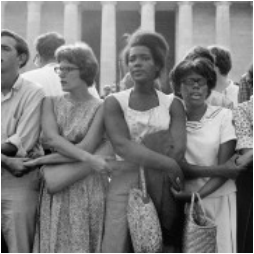
The family legacy in this piece is strongly influenced by a desire to pass the torch to my nephew Aidan who is starting his first year at SUNY@Buffalo in a Social Justice cohort. Much thanks to Allen and Tuesday, my writing group ~ Habiba Alcindor, Lex Schroeder, and C.V. Harquail ~ and thinking partner Willie Tolliver who all gave strong feedback and encouragement. It's subtle and mercurial this kind of thinking and learning together. ~ Kelly McGowan
The first time that I felt empathy for a white person losing his unconscious sense of accomplishment, I was a student leader in the university anti-apartheid divestment movement of the mid-80s. It was also the first time that I heard and declined joining the activist chant “SHAME SHAME SHAME,” which I would continue to hear from ACT-UP through recent #BlackLivesMatter (voiced mostly by white allies) protests.
During the divestment protests, I searched for but never found an alternative chant or tactic for protesting the university’s middle managers, all white men who reminded me of my father. My peers called them Kapos. I called them the 'immigrants’ sons'. They had white ethnic last names and held some power, but all reported up. I recognized in them their generations’ particular sense of accomplishment that had been fostered by their parents’ pride and national policy designed to build America’s white middle class. Their struggle with shame was not as much about being implicit in the immoral treatment of Black South Africans as it was in the possibility of siding against white supremacy.
"Shame is a tool of oppression, not change." Lindy West
I participated in many years of activist strategy discussions before I gained new insight into my gut reaction against the “SHAME SHAME SHAME” chant and coinciding longing for more transformative tactics. There were over a hundred white people and two black women at my father's funeral in Buffalo, NY (which had recently been featured in a UN report as one of the US cities with the greatest economic disparity along racial lines). My sister and I raced to them at the end of the service eager to know their connection to us. They were both VPs at AT&T, formerly Bell Telephone where my father had been a middle manager for most of his working life.
They told us that they were the first black women telephone operators in the early 60s and that my father had hired them saying that he would stand by them if they “come early, stay late and keep perfect hair.” They expressed gratitude for his action and, at the same time, did not spare us the messiness of its execution. It was profoundly intimate. I felt a unique mix of shame about my father’s collusion with the white supremacy of hair and pride in their recognition of his bold hiring.
My father never told us this story. My mother had never heard it. We couldn’t imagine him bragging about it to any of his Irish or Italian male friends, many he had known since high school. There was no room in his lifetime for this small act to be an accomplishment. There was no shame in not doing what he ultimately chose to do. At that time and place, the people who had real power to shame him were those closest to him ~ colleagues, friends or family who might have called him out as a race traitor or, more simply if the women had not passed the test, in making a ‘dumb’ or ‘liberal’ decision.
In that moment, without a movement or anti-racist training, my father decided to act against the cushion of white supremacy that surrounded him and open ~ if only a crack and with conditions ~ one small gateway to the American Middleclass/Dream. I can only imagine that he was encouraged by Kennedy’s civil rights speeches with the implicit understory of an Irish Catholic who had overcome the legacy of prejudice and its structural barriers and Martin Luther King Jr.'s appeal to the higher morals of white Christians.
More than 40 years later in the days of the 1% and Donald Trump, to feel shame about the condition of the American Dream and the absence of leaders with moral authority sounds like a healthy reaction. For white people, to be in relationship with people of color and not feel some shame is impossible. The challenge for all of us in these times is to welcome shame as a condition of intimacy and a necessary experience when working for transformational change, rather than using it as a weapon.
 RSS Feed
RSS Feed